This classic, beef bone broth gives you everything you need for the most nutritionally packed liquid to enhance any meal or provide warmth and nourishment for your body!
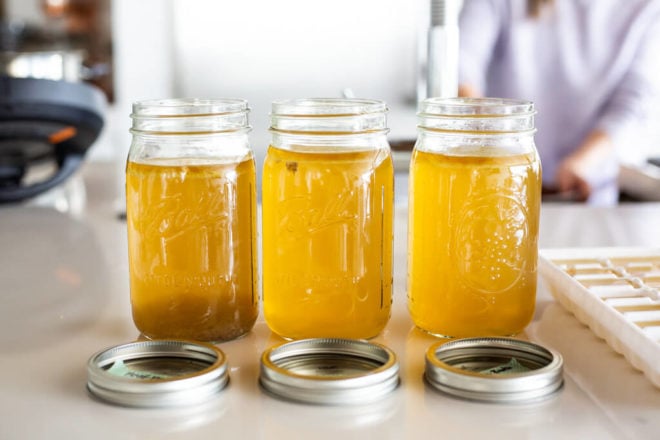
Beef Bone Broth
The health and healing benefits of bone broth are second to none, and this classic beef bone broth is no exception! Made by slowly extracting all of the minerals and collagen from the bones, this beef bone broth has everything you need to support your health and healing in any season of life!
Origins of Bone Broth
The origins of bone broth date back to over 2,500 years ago! It has a long-standing history of healing significance and is historically used in Chinese medicine to strengthen kidneys, build blood volume, and support digestive health. Long before the standard cooking pot was invented, ancient cultures used to cook the meat and bones (or otherwise inedible parts of the animal) with water and vegetables inside the abdominal cavity of animals using hot stones that were warmed in the fire.
What are the benefits of bone broth?
Along with the true nose-to-tail practice in minimizing waste, there are SO many health benefits from consuming homemade bone broth since it is packed with tons of essential vitamins and minerals. Here are some of the added benefits from adding bone broth to your regular line-up:
- Builds and strengthens bones – animal bones contain trace minerals (like calcium, magnesium, phosphorus to name a few) that are vital to building and strengthening your own bones!
- Supports joint health – as the connective tissues break down in the cooking process, glucosamine and chondroitin are released into the broth and help to support joint health.
- Strengthens hair, skin, and nails – you also get a big dose of protein collagen and all the important amino acids that are great for strengthening your hair, skin, and nails.
- Supports digestion – bone broth is super easy to digest and easy on the stomach thanks to the gelatin that is created in the process.
- Anti-inflammatory – the amino acids in bone broth have anti-inflammatory compounds that have been researched to help combat inflammation in the body.
Ingredients for Beef Bone Broth
The list is pretty simple and makes for the most delicious warming sip. Here’s what you’ll need:
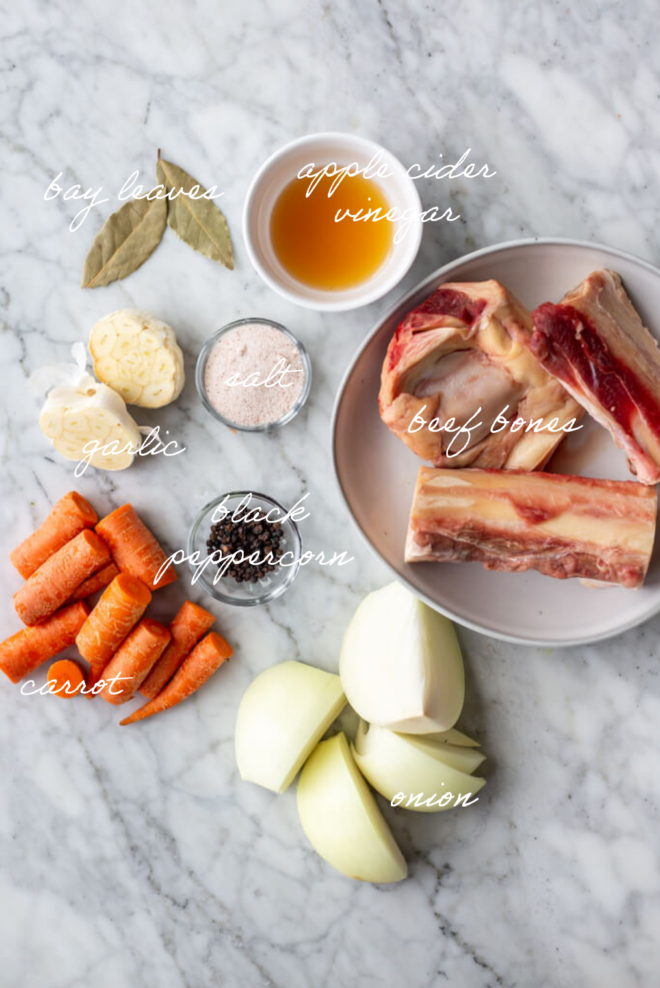
- Beef Bones – 2 pounds of beef bones (marrow, knuckle, etc.) make up the bone base of this beef bone broth.
- Onion – 1 onion, unpeeled and quartered, heads in next to add a body to the base.
- Carrots – 2 carrots, unpeeled and cut into large chunks, add a subtle sweetness and rich color to the broth.
- Garlic – 1 bulb of garlic, unpeeled and cut in half cross-wise, adds a nice flavor punch.
- Apple Cider Vinegar – 2 tablespoons of apple cider vinegar help break down the connective tissues and add acidity to the broth.
- Bay Leaves – 2 bay leaves head into the pot to give a boost to all of the developing flavors.
- Black Peppercorns – 1 teaspoon of black peppercorns give a little spice to the broth.
- Sea Salt – sprinkle in 1 tablespoon of sea salt to round out all the flavors of the broth.
- Water – 4 quarts of water will act as the base here.
Ingredient Modifications
While this recipe makes for a really flavorful and nutritious broth on its own, there are a lot of ways that you can modify the broth. Here are a couple of ideas:
- Add additional herbs and spices: to add additional flavor to your broth, you could add herbs (sage, thyme, and rosemary are common and really tasty in broth bases) and spices (turmeric and ginger are classic additions).
- Substitute the bones: use chicken bones to make chicken bone broth (chicken feet, necks, and wings pack the highest nutritional punch) or fish bones for a lighter, more delicate broth.
Supplies Needed for This Recipe
- Instant Pot -or-
- Slow Cooker -or-
- Large Stock Pot
How to Make Beef Bone Broth at Home
Making bone broth is actually a really easy, hands-off process. Here are some options for methods to make your homemade bone broth:
- Instant Pot: combine all the ingredients in the Instant Pot and cook on high pressure for 2 hours.
- Slow Cooker: combine all the ingredients in the crock pot and cook on low for 12-24 hours.
- Stove: combine all the ingredients in a large stock pot and cook on a low simmer for 12 hours.
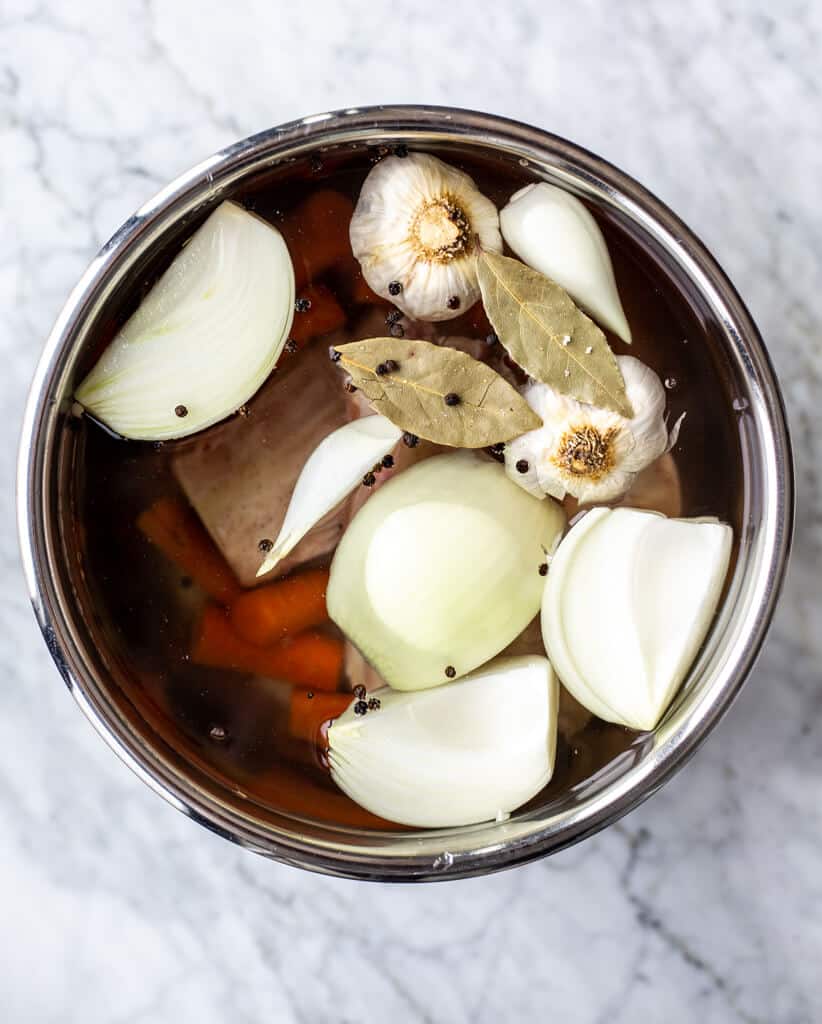
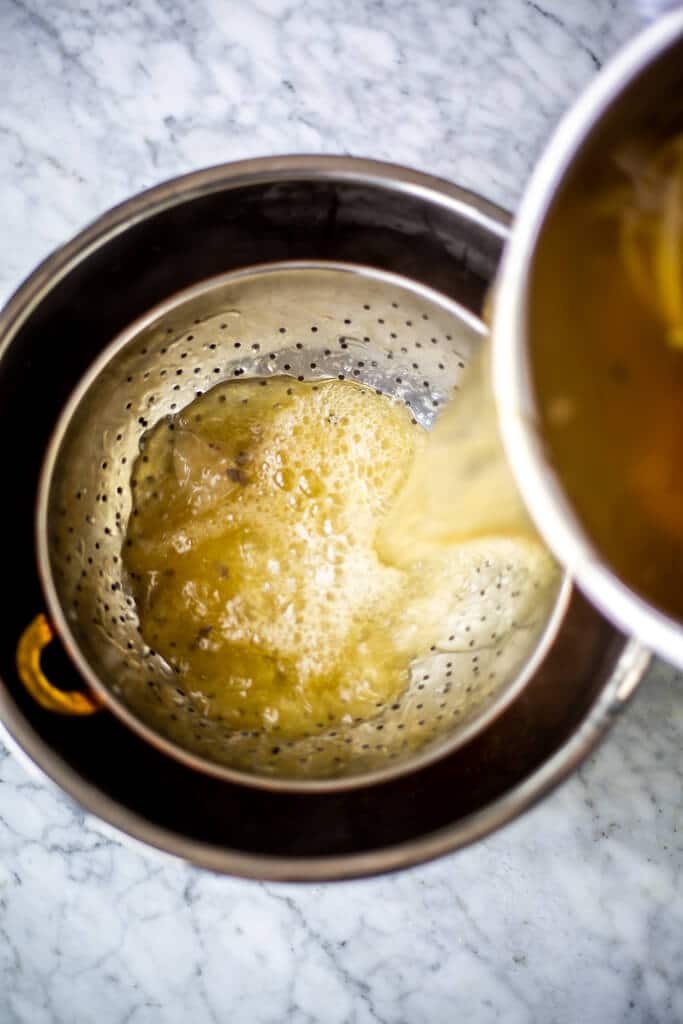
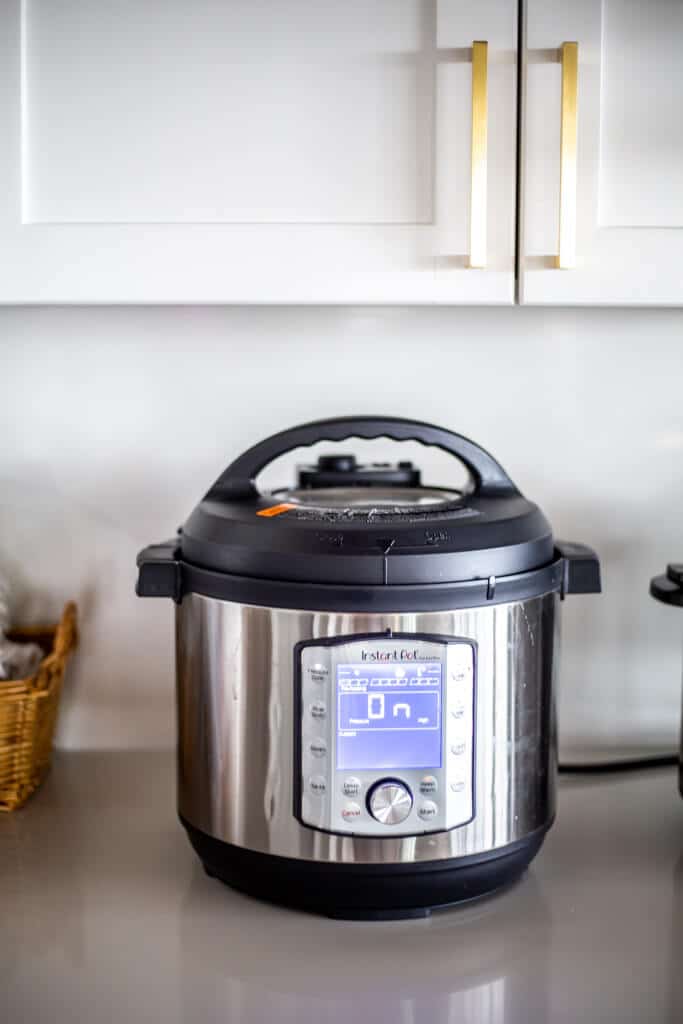
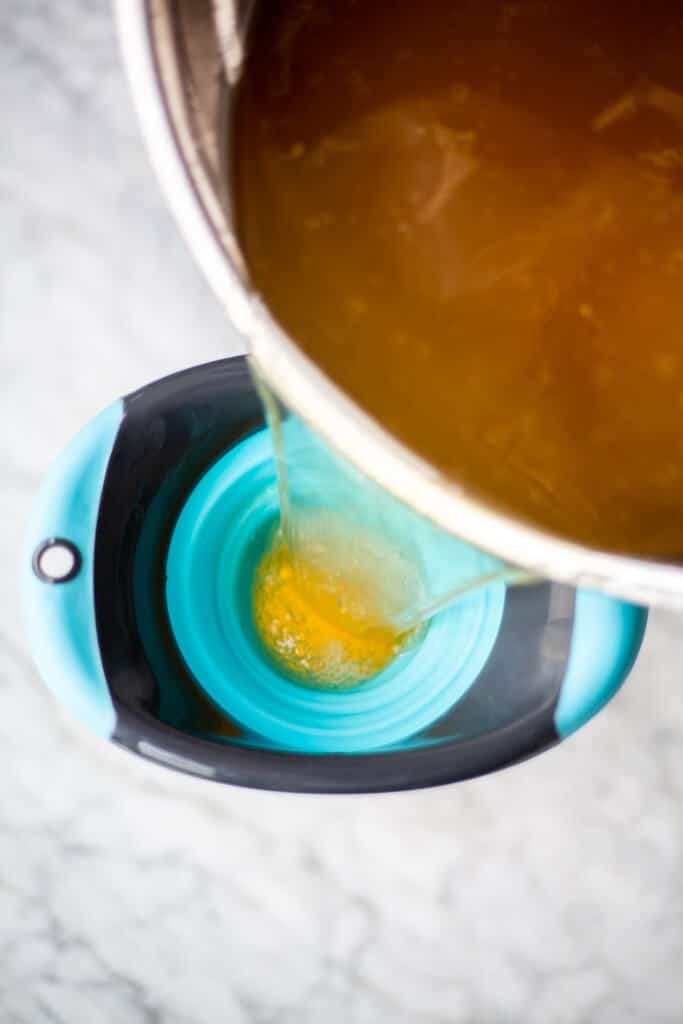
Tips and Tricks for Homemade Bone Broth
- Use less obvious bones. Use the bones/animal parts (short ribs, oxtails, knuckles, or neck bones, hooves, marrow bones) with the most cartilage and collagen to produce the heartiest broth.
- Save your scraps. If you’re cooking anything with a bone (steaks, ribs, a whole chicken, etc.) or vegetables (onion, carrots, garlic, etc.), save the bones and veggie scraps in a bag in the freezer and make bone broth when the bag is full. Not only will the scraps deliver some serious nutrients and flavor, but it also gives these items that you would otherwise throw away a second life.
- Roast the bones. While not a necessary step, roasting the bones at 400℉ for 30 minutes prior to simmering adds a richer caramelized flavor to the broth.
- Ask your local butcher for bones. Ask your local butcher if they have any bone or animal scraps you can use for your bone broth. This is usually a really cost effective way to get bones.
What are the best bones to use for beef bone broth?
The best bones for beef bone broth are the ones with the most cartilage and collagen. These bones are often overlooked but are loaded with the nutrients that you want in a hearty broth. Some of the best bones are:
- Knuckles
- Oxtails
- Hooves/Feet
- Marrow Bones
- Joints
What does vinegar do in bone broth?
The acid in the vinegar helps draw out the minerals and collagen from the bones by loosening and dissolving the tougher bits around the bones and cartilage.
Does homemade bone broth have collagen?
Yes! The vinegar and the process of slow cooking help to draw out the collagen proteins from the bones. Collagen becomes gelatin-like when it is extracted from the bones and is what gives your bone broth a jiggly consistency when cooled. Truly, the jigglier when cool, the better!
Is it cheaper to make your own bone broth?
Making your own bone broth doesn’t have to cost a lot of money! Stopping by the butcher counter at your local grocery store and asking if they have any bones for sale is a great way to get your hands on some bones for a reasonable price. Another easy way to cut down on cost is to save the scraps from vegetables (onions and carrots) and bones (steaks, ribs, etc.) in a storage bag or container in the freezer and pull them out when you are ready to make your bone broth.
How is bone broth different from regular broth or stock?
There are various frames of thought here, but generally speaking, it all comes down to cook time. Stock and bone broth are both made from the bones of the animal, whereas regular broth is made from the meat of the animal and is usually only simmered for a short amount of time (around 1-2 hours). Stock is usually simmered for 6-12 hours, while a good bone broth is simmered for 24 hours or more (unless you’re using an Instant Pot), allowing for the collagen and nutrients to be fully extracted from the bones and into the broth.
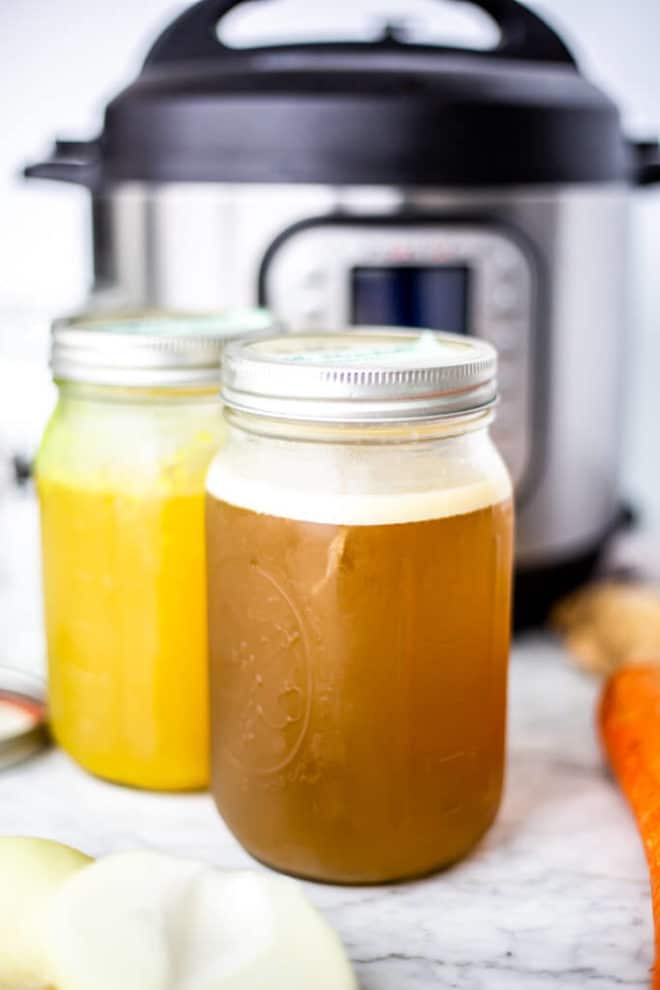
What are some ways to use bone broth?
There are countless ways to use bone broth! Here are a few ideas:
- Sip it. Heat it in a mug and sip on your bone broth as a warm and comforting drink.
- Use it in soup. Use your bone broth as the base for your favorite soup recipe.
- Substitute for water. Bone broth can replace any water or liquid component in a dish, even in baking (think: pancakes or waffles with a little savory punch and some added nutrition!).
- Bone Broth Rice. Use bone broth in place of water for your rice to make a rich and nutritious rice!
How much bone broth can I drink each day?
Bone broth is loaded with key nutrients and protein that can be beneficial for your body — the amount to drink daily will vary depending on each person’s unique health needs and goals. Generally speaking, 1-2 cups (8-16 fluid ounces) of bone broth a day is great for supporting a balanced intake.
How to Store and Reheat Bone Broth
There are plenty of options for storing your bone broth. If you are keeping your broth in the fridge, simply store it in an airtight container(s). If you are making a large batch or do not plan to consume the broth within 3-5 days in the fridge, I recommend freezing your broth! Check out our article on How to Freeze Bone Broth.
- Ice Cube Trays – this is the most cumbersome process, but gives you the most flexibility in defrosting smaller portions at a time. To make bone broth ice cubes, you’ll pour the bone broth into the trays, freeze, then transfer to a bag or container once frozen.
- Gallon Ziploc Bags – this method is super quick, but can be difficult to use after freezing if your broth is not completely thawed. Simply cool your broth, then portion into the bags, label, and lay flat to freeze.
- Plastic Jars – while not my personal preference, it is definitely an option to freeze in plastic jars. To freeze in plastic jars, let your broth cool to handling temperature, pour into the jars (leaving an inch at the top), secure the lids, and freeze.
- Glass Mason Jars – my personal preferred method for freezing. Just make sure you leave at least 1” of space at the top of the jar to account for the broth expanding as it freezes. Read THIS ARTICLE for tips on how to successfully freeze your broth in glass jars without them breaking on you.
To serve: Defrost your bone broth in the refrigerator overnight (if frozen). Reheat on the stove in a pot or in the microwave until warm. For sipping, I recommend adding an extra pinch of sea salt and fresh lemon juice, about 1 whole lemon per quart of broth, to reinvigorate the flavors and add some brightness. Enjoy!
Homemade Beef Bone Broth
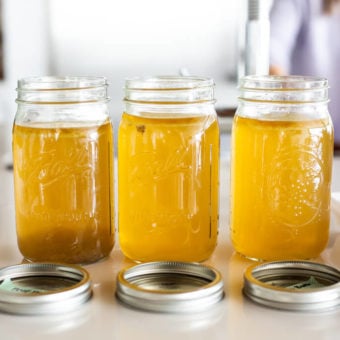
Ingredients
- 2 pounds beef bones marrow, knuckle, etc.
- 1 onion unpeeled and quartered
- 2 carrots unpeeled and cut into large chunks
- 1 bulb garlic unpeeled and cut in half cross-wise
- 2 tablespoons apple cider vinegar
- 2 bay leaves
- 1 teaspoon black peppercorns whole
- 1 tablespoon sea salt
- 4 quarts water
Instructions
- Instant Pot – combine all of the ingredients in the Instant Pot and cook on high pressure for 2 hours.
- Slow Cooker – combine all of the ingredients in the crockpot and cook on low for 12-24 hours.
- Stove – combine all of the ingredients in a large stockpot and cook on a low simmer for 12 hours.
Recipe Notes
- Use less obvious bones. Use the bones/animal parts (short ribs, oxtails, knuckles, or neck bones, hooves, marrow bones) with the most cartilage and collagen to produce the heartiest broth.
- Save your scraps. If you’re cooking anything with a bone (t-bone steaks, ribs, etc. or chicken carcass for chicken turmeric bone broth) or vegetables (onion, carrots, garlic), save the bones and veggie scraps in a bag in the freezer and make bone broth when it is full. Not only will they deliver nutrients and flavor, but it gives items you would otherwise throw away a second life.
- Roast the bones. While not a necessary step, roasting the bones at 400℉ for 30 minutes prior to simmering add a richer, caramelised flavor to the broth.
- Ask your local butcher for bones. Ask your local butcher if they have any bone or animal scraps you can use for your bone broth. This is usually a cost effective way to get bones on hand.













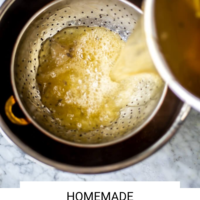
Hello. I want to read the article about freezing in jars, but the link did not open.
Thanks for all you do.
Thank you for bringing this to our attention. We’re so sorry about that! We have fixed the links now. You can also find the article on How to Freeze Bone Broth here. -Team FF